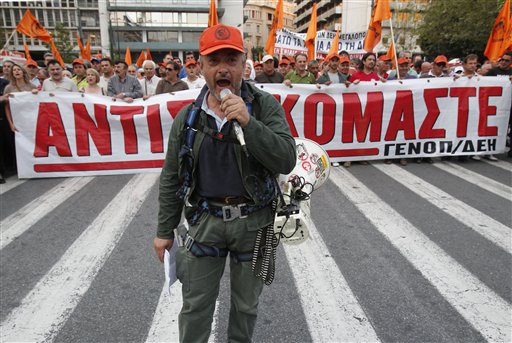
Greece has one of the lowest living standards in Europe; one-fourth of Greece’s workers live in poverty. Greece also has billionaires and millionaires who pay little or no tax. Despite those inequalities, major media in the U.S. and Europe offer myths to explain Greece’s economic crisis. Corporate representatives blame bonus payments, early retirement, and social programs. The actual causes are high levels of labor exploitation, runaway shops, and tax evasion.
The first myth involves “bonus payments.” Employers pay Greek workers in 14 installments. However, it is untrue that the workers receive two monthly “bonus” paychecks without earning them. In addition to 12 monthly payments, employers divide wages and salaries so that there is enough for Christmas and Easter spending and for summer vacations. Dartmouth professor Elias Papaioannou says the 14-payment salary system is not a problem for the Greek economy – “it’s just an alternative way to distribute.” Paychecks of Greek workers are still too small for them to make sufficient purchases to keep production running.
A second myth concerns retirement age. At one of the rallies by Greek workers protesting austerity measures, trade union leader Stathis Anestis of the General Confederation of Labor reminded us that “it is incomprehensible, outrageous, unacceptable to cut pensions of 600 euros, 700 euros … At the same time, those who owe the pension funds, have looted the pension funds, are immune: no one has gone to jail.” Furthermore, although pensions are relatively low, retirement age is in line with other European nations, age 60 for women, 65 for men. Despite false reports, only workers in a small number of dangerous jobs are permitted to retire at 50.
Third, it is not government spending for social programs but tax evasion by the rich that causes Greece’s financial crisis. Social programs are for quality of life. They include health care, retirement, survival and disability benefits. There are funds for rural folks, for small business, and for military personnel. There are also provisions for professionals. The size of Greece’s public spending (50.4 percent of GDP in 2009) is less than the European Union average (50.7 percent in 2009). The money needed to pay for fully funded benefits requires steeply progressive taxation. The big-money tax evaders have more than enough to cover the deficit. Many leave the country. International law enforcement would bring them to justice.
Greece’s crisis has similarities with our own. Opponents of the Employee Free Choice Act stifle the trade union struggle for decent wages for all, and the right wing continues to attack Social Security and every other government social program. Low wages and benefits cause crises; consequently, what is good for labor is good for the country. The crises will continue as long as the rich squander needed funds and resources.
Photo: Public Power Corp. workers hold a banner reading, in Greek, “We Resist,” during a protest in Athens outside the Greek Finance Ministry against the planned privatization of state-owned companies, June 28. Greek public services and transport were shut down last week by a general strike against proposed pension and labor “reforms.” (AP/Petros Giannakouris)












Comments